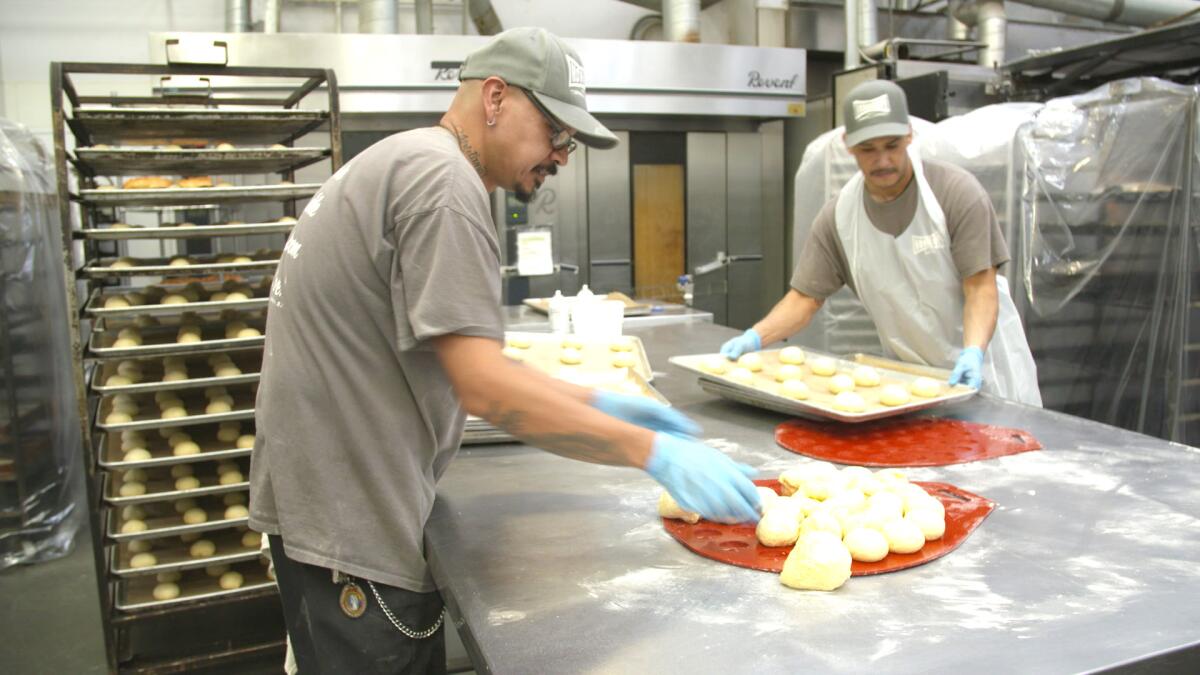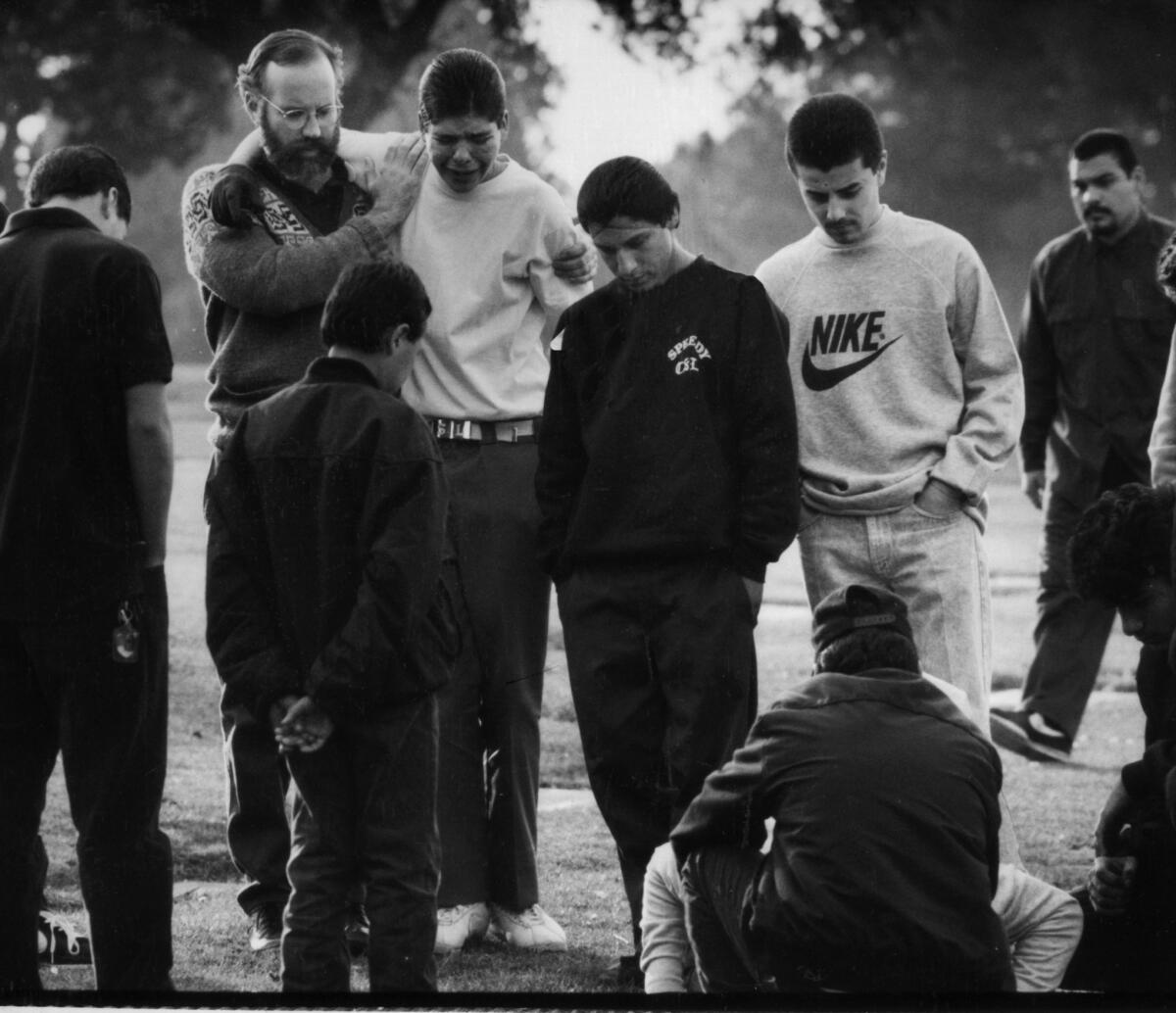Father Gregory Boyle has an ambitious plan to expand Homeboy Industries

- Share via
Homeboy Industries has long been known for Father Gregory Boyle’s slogan, “Nothing stops a bullet like a job.”
But when former gang members and convicted felons walk through the doors at Homeboy headquarters seeking help, Boyle’s ambition goes far beyond just getting them a job.
The goal is healing, he says, and that’s why Homeboy provides a suite of wraparound services, including education, mental health counseling, substance-abuse support and a tattoo removal operation run by volunteer doctors and nurses. Soon, Boyle hopes to see a further expansion of services as Homeboy moves forward with plans to build its own housing center.
“The number of homies who are living in their car or couch surfing is astounding,” Boyle said during an interview about his book, “Barking to the Choir.” “Sixty percent of all gang members are essentially, effectively homeless.”
Boyle will join the L.A. Times Book Club on Dec. 16 for breakfast and a conversation with author Héctor Tobar about his book and his work with formerly gang-involved youth and adults. (The book club event, which includes tours of Homeboy Industries, is sold out.)

A Jesuit priest, Boyle began working with gang members 31 years ago as pastor of Dolores Mission Church in East Los Angeles. He initially worked on finding employment opportunities in an enterprise started in 1988 as Jobs for the Future. When jobs were not forthcoming, Boyle founded Homeboy Bakery and later expanded that into the nonprofit Homeboy Industries.
The organization provides jobs and second chances through nine revenue-producing enterprises including Homeboy Bakery, Homegirl Café, catering, a silkscreen shop, farmers market stands and a grocery division selling salsa and guacamole. Preparing formerly incarcerated people to enter the workforce is just part of Boyle’s mission.
His focus now is on healing the “whole person,” which Boyle describes as the only way to make sure clients stay clean and don’t reoffend.
Homeboy currently offers access to various sober-living facilities and temporary housing. But Boyle longs for something more permanent. He says the nonprofit now has approval from its board of directors to make this dream a reality by adding transitional housing near Homeboy headquarters on West Bruno Street, at the edge of L.A.’s Chinatown.
The housing facility, which is being designed, would be intended for former gang members enrolled in Homeboy’s flagship 18-month training program. Homeboy CEO Thomas Vozzo says the new building would house about 100 residents as part of a broader campus expansion. Given the need to acquire land and financing, Vozzo did not expect to break ground before 2021.
“We’re just kind of bursting at the seams,” Boyle says. In addition to the transitional housing for former gang members and their families, the Homeboy team hopes to create a day-care center and develop space for mental health counseling, much of which is currently done by volunteer professionals off-campus.
The planned expansion reflects a striking turnaround for an enterprise that was struggling to survive less than a decade ago, when it was forced to lay off 300 employees to close a $10-million budget gap. These days, Boyle says, Homeboy is doing well financially, although it relies on grants and donations for nearly half its $22-million annual budget.
In “Barking to the Choir,” Boyle preaches the “power of radical kinship,” the idea that everyone belongs in what he calls the “circle of compassion,” including people who have committed acts of terrible violence.
“On a micro level, we’re helping gang members redirect their lives, but on some larger level we’re proposing: What if we were to invest in people rather than just incarcerate our way out of problems?”
Boyle asks the reader to offer compassion to killers as well as victims of violence. “Every homie I know — every one — has carried a load 100 times heavier than I have had to carry, weighed down by torture, violence, abuse, neglect, abandonment, or mental illness,” he writes. “Most of us have never borne that weight.”
Boyle began working to broker peace in his deeply impoverished parish in the 1980s, and later moved his gang intervention program to its current headquarters downtown. Boyle recently buried his 231st young person killed as a result of gang violence.
He says there is one reason any young person joins a gang, and that is a “lethal absence of hope.” “No kid is seeking anything when he joins a gang, he’s always fleeing something,” he writes. “There are no exceptions.”

For more than 14 years Boyle has battled leukemia, and he writes that his diagnosis is one of the things that has shaped his faith. “I would never trade it for anything,” he says.
“Homeboy is not about just reaching gang members but allowing yourself to be reached by them,” he says. “Once you can be on the receiving end of their tenderness and goodness, and feel cherished by them, that’s a therapeutic moment for them. They’re able to inhabit their truth, and that would not have happened in exactly the same way if I had not received that diagnosis.”
Boyle, who previously wrote “Tattoos on the Heart,” is working on a third book called “The Whole Language” that he said will focus on “the power of boundless compassion.” The book takes its title from the story of a former gang member from Uzbekistan, nicknamed “Russian Boy,” who did time in SoCal. A former cellmate recounted to Boyle that the inmate would go to the hallway to call his mother, and they would speak in Russian. The cellmate recounted the experience with amazement, saying, “Damn, G, he spoke the whole language!”
To Boyle that is the perfect description of what he calls his mystical quest to reclaim the “whole person.”
“What if we spoke the whole language, which for me is about tenderness, and how that is the highest form of spiritual maturity?” Boyle says. “So I have a title, I just need a book.”
Book Club
Father Gregory Boyle at a glance
Born: Los Angeles, 1954 (age 65).
Education: Graduated from Loyola High School of Los Angeles. Earned a bachelor’s degree from Gonzaga University and master’s degrees from Loyola Marymount, Weston School of Theology and the Jesuit School of Theology.
Career: Ordained as a priest in 1984. After a year living and working in Bolivia, he was appointed pastor of Dolores Mission Catholic Church in Boyle Heights.
Homeboy Industries: Began working with gang members to prevent violence and initially worked on finding employment opportunities through Jobs for the Future in 1988. Boyle later founded Homeboy Bakery and expanded into the nonprofit Homeboy Industries.
Honors: Winner of the California Peace Prize and member of the California Hall of Fame. Recognized by the White House as a Champion of Change. Recipient of the University of Notre Dame’s 2017 Laetare Medal, the oldest honor given to American Catholics.
Books: “Tattoos on the Heart: The Power of Boundless Compassion” and “Barking to the Choir: The Power of Radical Kinship.”
Twitter: @FrGregBoyle
Web: homeboyindustries.org/
More to Read
Sign up for our Book Club newsletter
Get the latest news, events and more from the Los Angeles Times Book Club, and help us get L.A. reading and talking.
You may occasionally receive promotional content from the Los Angeles Times.









